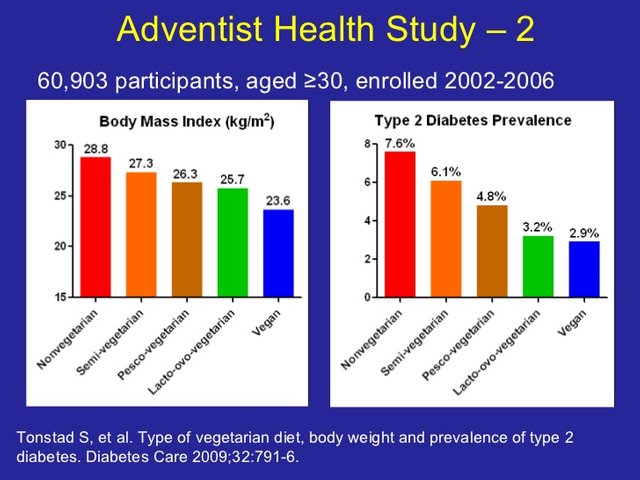Eating Even a Bit of Animal Products Negatively Impacts Health
With recent scientific research, we know many plants are good for our health and protect against certain diseases from cropping up. Since the 1970's, it's been suggested that plants are protective against diabetes. Eating meat one or more times a week significantly raises the risk of diabetes. The more it's eaten, the higher the risk. Even weight isn't enough to put plants down. People of the same weight who eat more plants still have lower rates of diabetes compared to those who don't.

People who consume more plants will live longer and still have lower rates of chronic diseases and death. The Adventist-2 study shows how efficient plant eating is in reducing the rate of diabetes. Of the over 89,000 people that were looked at in this study, those who ate a strictly plant-based diet had 78% lower diabetes rates among them. The study even showed an incremental protection building up when comparing people moving from daily meat eating, to weekly, to just fish, to no meat all, and then to eggs and dairy being removed. The best results were when no animal products are consumed at all.

Blood pressure is also positively correlated to increasing the proportion of plant foods. Excess body fat is also reduced, with only exclusive plant eating people not being overweight on average compared to other dietary groups. And even if not eating exclusively plants, there is an incremental drop in excess body fat with fewer animal products consumed. Any steps made to reduce the consumption of animal products results in benefits to our health.
A later study done in Taiwan indicates the increase of meat in their Asian population in recent years has increased the rate of diabetes, which they formally had lower rates when they consumed less meat.
They had a westernization of their diet which includes fast food and junk food, so the researchers didn't compare the typical diet to that of a vegetarian diet. Instead they looked at vegetarian and nonvegetarian Buddhists specifically who ate a traditional Asian diet that was mostly plant-based. Little meat and fish was consumed, at about 8% of the meat intake for men compared to the US, and 3% for women.
After accounting for weight, family history, exercise and smoking, vegetarian men had half the rate of diabetes, and vegetarian women had a quarter of the rate of diabetes compared to their nonvegetarian Buddhists counterparts. This means that even if you're eating a little bit of meat, one serving a week for these nonvegetarian Buddhist women, it was still no match for vegetarians who consumed no animal flesh whatsoever.
These two studies go to show just how powerful of a positive impact plants have to promote health, and how powerful of a negative impact animal products have to the detriment of our health. Just because there are nutrients found in animal products, doesn't mean they are overall healthy for us to consume.
We can survive by eating animal products if we need to, but plants are the real way to live and thrive.
Resources:
https://www.ncbi.nlm.nih.gov/pubmed/3985239
https://www.ncbi.nlm.nih.gov/pubmed/21983060
http://journals.plos.org/plosone/article?id=10.1371/journal.pone.0088547
https://nutritionfacts.org/2016/10/11/what-about-eating-just-a-little-meat/